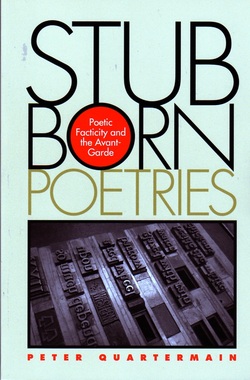
Peter Quartermain retired from teaching at the University of BC in 1999. During the preceding 36 years he had edited three editions of an American poetry anthology, published the chapbook Basil Bunting: Poet of the North, co-edited an anthology of British and Irish poetry and a collection of essays on Objectivist poetry, and in 1992 published the study Disjunctive Poetics: From Gertrude Stein and Louis Zukofsky to Susan Howe. Since then he has co-managed the small Vancouver press Nomados, edited the Collected Early Poems and Plays of Robert Duncan (2012), and presented numerous international conference papers on contemporary poetry. His edition of the Collected Later Poems and Plays of Robert Duncan is scheduled to be released later this year by the University of California Press. Many of his recent conference papers are collected here in Stubborn Poetries.
Quartermain has been interested throughout much of his career in poets whom he views as having deliberately located their work outside the canon of academically recognized poetry. He opens this collection with the essay “Canonical Strategies and the Question of Authority” in which he contrasts how T.S. Eliot, through the “cajolery and bullying” of his essay “Tradition and the Individual Talent,” presumptuously redefined the English canon to include himself with how William Carlos Williams, in his prologue to Kora in Hell, defined poetic value as “unmediated by either a set of social values or the views of the critic” (17). Quartermain thus sets up a view that pervades the collection that canonical poets tend to be the astutely self-interested while those committed more to language and poetry than to their careers tend to be non-canonical.
Quartermain has also been interested during most of his career in poetries that are not only contemptuous of canonicity but that also ‘stubbornly’ resist both paraphrase and the attribution of meaning. Several times in the
Again and again in his critical writing Zukofsky is scornful of what he calls “the predatory intent” (Prepositions + 18), and – to put it bluntly – he cultivates opacity because he wants to make predatory reading impossible. (92)
His emphatic rejection in his introduction of the presumably predatory poetry-reading method still taught in universities – a “method which assumes that the work of art is, in its complexity, self-sufficient, ahistorical and atemporal: the meaning of the work can be known objectively” and that “the task of the reader is, through detailed consideration of relationships within the text ... to discern that meaning and its movement, and ... discover, or rather establish, the essential unity of the work” (4) – aligns him with those poets he is studying, who refuse to write texts that are unified in either form or meaning. This alignment however is, in a sense, itself ambiguous and disunified. Adopting for his criticism many of the disjunctive and associative structures of the stubborn poetries he is reading, he leaves unclear or unstated such matters as whether or not in his view explicitly thematic poetries are lesser than stubborn poetries, or less ‘historical,’ whether only attemptively canonical poetries should risk intersecting explicitly with ethics, or whether in poetry it is aesthetics that should be ethics. But Quartermain’s strength here is also that when he opens such questions he prefers to leave them relatively open – rather than, like Eliot, defensively and prescriptively closed. This ambiguity extends to the book itself: he has chosen not to unify or ‘harmonize’ the collection. The essays often ‘stubbornly’ repeat each other’s references, quotations and focusses. Is that good? It is noticeable. It is interestingly and boldly (and perhaps even ironically) consistent.
One of the many questions that he leaves open is his definition of the avant-garde: who are the avant-garde of his subtitle? The essays address a range of writers: Eliot, Pound, Zukofsky, Williams, Lorine Niedecker, Basil Bunting, Mina Loy, George Oppen, Richard Caddel, Charles Olson, Robert Creeley, Steve McCaffery, Bruce Andrews. Can a writer be both canonical and avant-garde? The opening essay suggests that Eliot preferred not to be avant-garde. Is it necessary to be opaque, to practice “poetic facticity,” to avoid canonicity, to be avant-garde? Is it necessary to write in juxtapositional ‘paratactic’ syntax rather than a subordinating ‘hypotactic’ syntax? The syntax of his subtitle, “poetic facticity and the avant-garde,” is paratactic rather than hypotactic. It places the two terms together without specifying a relationship between them. A reader is free to conclude equally that “poetic facticity” is necessarily associated with the avant garde,” necessarily contentious for the avant-garde, usually contentious for the avant-garde, or in some other relationship to it. Quartermain’s book, however, privileges by its focuses mostly poets to whom both facticity – usually the facticity of language – and parataxis were primary to their poetics.
By implication he leaves most thematic poets, including Eliot, outside of the avant-garde. Outside also would seem to be most writers who explicitly associate their work with a political cause, such as anti-racism, anti-colonialism, feminism, or nationalism. Of particular note in this regard is his essay “Basil Bunting: Poet of the North,” in which he contrasts Bunting’s stridently localist political opinion that Northumbria remains oppressed by London and the southern counties with the enigmatic physicality and non-hierarchical syntax of his poems. His praise for Bunting’s having enacted in his poems a non-exploitative, non-hierarchical syntax that parallels the non-exploitive non-hierarchical political syntax he desires (he quotes Bunting “I am sure that any scheme, anything extensive or uniform, must put more and always more men under the mortmain of ‘administration’ [37]) comes close to praising him for having in his poetry made his political views opaque. It also implies if not a hierarchy at least a distinction among politically engaged writers – Nicole Brossard and Gail Scott much more likely ‘avant garde’ than Lee Maracle, Nourbese Philip more so than George Elliott Clarke. Of course it would not be avant-garde of Quartermain to say so, while arguably avant-garde not to.
FD
 RSS Feed
RSS Feed